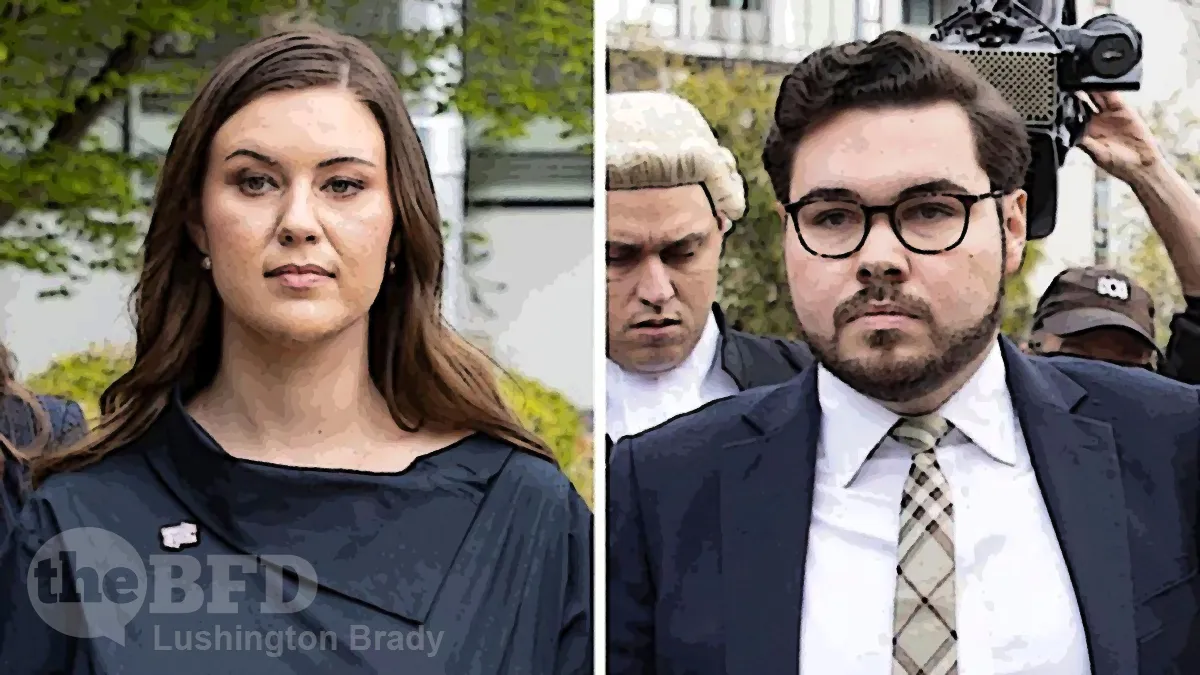Table of Contents
The most explosive court case in recent Australian history has ended with a spectacular squib from the accuser. All charges against the accused have been dropped, essentially because the accuser is refusing to return to court to give evidence. This follows the failure of rushed attempts to change the law in the accuser’s favour.
It’s an altogether unsatisfactory end to an unsavoury saga — one which contributed no small part to bringing down a government, and in the course, disrupted if not wrecked lives. The accuser will maintain that she has been denied justice. The accused will no doubt claim the same — and will almost certainly bear the odium of suspicion from a great many people.
The case is, of course, former political staffer Britanny Higgins’ accusation that she was raped by former colleague Bruce Lehrmann.
At 10am ACT Director of Public Prosecutions, Shane Drumgold SC, delivered a statement outside his office confirming that the matter of R v Lehrmann will not be prosecuted again next year as planned.
After delivering his statement Mr Drumgold refused to take questions.
What excuse did Drumgold give?
“I need to consider the harm that could be occasioned particularly from an ongoing prosecution,” Mr Drumgold said.
“I’ve recently received… compelling evidence from two independent medical experts that the ongoing trauma associated with this prosecution presents a significant and unacceptable risk to the life of the complainant.”
For his part, Lehrmann hasn’t had a cake walk, either.
After his arrest Mr Lehrmann had told police the case had “rocked my world” and driven him to contemplate suicide.
The Australian
So, not to put too fine a point on it, Higgins is taking her bat and ball and going home. This follows the first trial, where she declined to return to court to give evidence for nearly a week. That first trial ended spectacularly when, after days of jury deadlock, it was alleged that a juror had brought outside research into the jury room.
Then the government tried to change the law to suit the accuser.
This proposed legal change being rushed through the ACT parliament potentially moves the goalposts for ACT Director of Public Prosecutions Shane Drumgold, making it easier for him to retry Lehrmann after the first trial was aborted in October.
As Janet Albrechtsen says, “We are losing our minds if we do not recognise that this undermines the rule of law. And dangerously so.”
This hasty change to the law has the perception of being aimed squarely at the retrial of Lehrmann. It means that Brittany Higgins may not be required to enter a courtroom and give evidence or be cross-examined again.
Under existing ACT law, an accuser in a sexual assault must give evidence in a remote witness room by audio-visual link. But Brittany Higgins chose, as is also her right under ACT law, to give evidence in the court room. This was her choice, it must be again emphasised.
Only the early part of her evidence, including her police record of interview, was given by audio-visual link from a remote witness room.
It’s no stretch to say that her courtroom testimony went badly. Higgins was caught out in several contradictions, and the uncomfortable fact that she did media deals and a five-figure book deal before contacting the AFP to reopen her police complaint. Higgins was then “unavailable”, mid-testimony, for nearly a week, before the trial was terminated for alleged juror misconduct.
The courtroom evidence was allegedly recorded, though no official order had been made to that effect.
Enter ACT Attorney-General Shane Rattenbury. His extraordinary proposal to alter the existing law will, effectively, make it easier for the DPP to retry Lehrmann if Higgins chooses not to give evidence in court in a new trial.
Many lawyers have told The Australian they are stunned by this development and by the perception of political interference in the retrial of Lehrmann.
The Australian
The question becomes, then: if the ACT law had been successfully changed, would the only testimony a new jury would have heard be only the early part of Higgins’ testimony — and certainly not the courtroom testimony which went so badly?
But the bid to change the law before the retrial failed.
And then the whole matter was dropped.
“The perception of political interference” stinks to high heaven.









